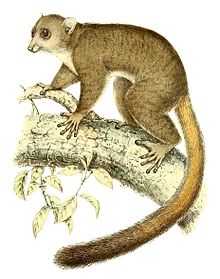Giant mouse lemur
| Giant mouse lemurs | |
|---|---|
 | |
| Mirza coquereli | |
| Scientific classification | |
| Kingdom: | Animalia |
| Phylum: | Chordata |
| Class: | Mammalia |
| Order: | Primates |
| Family: | Cheirogaleidae |
| Genus: | Mirza Gray, 1870 |
| Type species | |
| Cheirogaleus coquereli A. Grandidier, 1867 | |
| Species | |
|
Mirza coquereli | |
The giant mouse lemurs are small lemur species in the genus Mirza. They are native to the western deciduous forests of Madagascar, usually located near the coast or other sources of water. Their fur is an olive-brown colour dorsally, and yellowish-grey ventrally.
Originally the genus was described as a single species, Coquerel's Giant Mouse Lemur Mirza coquereli (named after the French entomologist Charles Coquerel), when this species was separated from the genus Microcebus in 1985. In 2005 a second species, Northern Giant Mouse Lemur M. zaza, was described.[1] In 2010, it was announced[2] that another distinct taxon with areas of reddish fur on back and tail had been discovered in the Berevo-Ranobe region.
Giant mouse lemurs weigh about 300 grams (11 oz). They are nocturnal, and they are active throughout the year; unlike other mouse-lemurs they do not hibernate, and instead they feed on homopteran larvae to sustain themselves. They are an arboreal species, and feed on fruit, flowers, and small animals like insects and spiders. They have also been known to prey on the Pygmy Mouse Lemur (Microcebus myoxinus) in captivity. They build multiple nests both in the wild and in captivity; males sleep alone while females often sleep in pairs. They travel quadrupedally, and have limited leaping capabilities.
These lemurs are heavily preyed upon by owls, as well as the Madagascar Buzzard (Buteo brachypterus). They feed at night to avoid predation, and they communicate with each other by both acoustic and olfactory signals, as well as ultrasound.
Footnotes
- ↑
- ↑ "New population of rare giant-mouse lemurs found in Madagascar". World Wildlife Fund (WWF). 2010. Retrieved 2 August 2010.
References
- Pages, E. (1980): Ethoecology of Microcebus coquereli during the dry season. In: Charles-Dominique, P.; Cooper, H.M.; Hladik, A.; Hladik, C.M.; Pages, E.; Pariente, G.F.; Petter-Rousseaux, A. & Schilling, A. (eds): Nocturnal Malagasy Primates: Ecology, Physiology, and Behavior. Academic Press: New York.
External links
| Wikispecies has information related to: Giant mouse lemur |